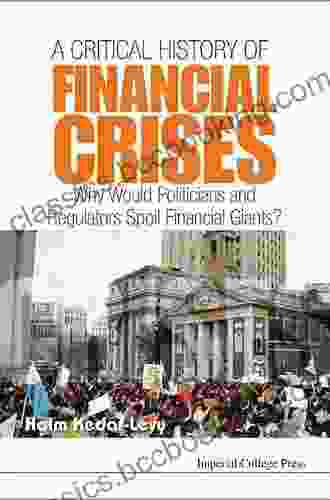Unveiling the Hidden Agenda: Why Politicians and Regulators Enable the Dominance of Financial Giants

In the intricate world of finance, colossal institutions known as financial giants cast towering shadows over the economic landscape. Their immense power and influence have ignited a fierce debate, with some questioning why politicians and regulators appear to favor these behemoths over the interests of ordinary citizens. This article delves into the murky depths of this complex issue, uncovering the motivations and consequences that shape this contentious relationship.
Political Influence and Financial Lobbying
Money exerts an undeniable influence in the political arena, and financial institutions possess vast resources to wield their clout. Through substantial campaign contributions, lobbying efforts, and personal connections, financial giants have developed deep ties with politicians of all stripes. These symbiotic relationships grant access to policymakers, allowing financial institutions to shape legislation and regulations to their advantage.
5 out of 5
| Language | : | English |
| File size | : | 6622 KB |
| Text-to-Speech | : | Enabled |
| Screen Reader | : | Supported |
| Enhanced typesetting | : | Enabled |
| Word Wise | : | Enabled |
| Print length | : | 226 pages |
For example, the Dodd-Frank Wall Street Reform and Consumer Protection Act, enacted after the 2008 financial crisis, aimed to prevent excessive risk-taking by financial institutions. However, the industry successfully lobbied for numerous loopholes and exemptions, weakening the intended safeguards. As a result, the financial giants emerged from the crisis with their dominance largely intact.
Regulatory Capture and Institutional Complexity
Regulators, tasked with overseeing the financial sector, play a crucial role in ensuring stability and protecting consumers. However, financial giants often possess intricate structures and complex financial instruments that challenge the ability of regulators to fully grasp their operations. This asymmetry of information creates opportunities for financial institutions to exploit regulatory loopholes, conceal risks, and avoid accountability.
Moreover, the revolving door between regulators and the financial industry perpetuates the risk of regulatory capture. Former regulators frequently secure lucrative positions within financial institutions, bringing with them valuable insights and personal connections. This revolving door can compromise the objectivity of regulators and weaken their ability to act independently.
Economic Concentration and Market Dominance
The concentration of power in the hands of financial giants has profound implications for the economy. When a small number of institutions control a significant share of financial assets, they gain substantial leverage over markets, businesses, and consumers. This concentration leads to reduced competition, higher fees, and less choice for ordinary citizens.
Financial giants also use their scale and market dominance to engage in anti-competitive behavior, such as predatory pricing or excluding smaller competitors. These practices stifle innovation and limit opportunities for new entrants, ultimately stifling economic growth.
Economic Barriers and Inequality
The undue influence of financial giants exacerbates economic inequality. Their privileged access to policymakers and regulators allows them to shape economic policies that favor their own interests. This, in turn, can lead to tax breaks, subsidies, and other incentives that further entrench their dominance.
The concentration of wealth in the hands of financial institutions also contributes to a widening wealth gap. The average citizen faces daunting barriers to accessing the same financial advantages enjoyed by the wealthy, creating a growing divide between the haves and the have-nots.
Systemic Risk and Financial Stability
The excessive growth and interconnectedness of financial giants pose a systemic risk to the entire financial system. When one of these behemoths experiences a crisis, its failure can ripple through the financial ecosystem, potentially destabilizing the economy.
The 2008 financial crisis serves as a sobering example of the dangers posed by systemic risk. The failure of Lehman Brothers and other financial institutions triggered a global recession, costing millions of people their jobs and savings. The ongoing COVID-19 pandemic has once again highlighted the vulnerability of the financial system to external shocks.
Consequences for Consumers and Society
The dominance of financial giants has far-reaching consequences for consumers and society as a whole. Ordinary citizens bear the brunt of increased fees, reduced competition, and limited access to financial services. They also face heightened exposure to systemic risks when financial giants engage in reckless behavior.
Moreover, the excessive influence of financial giants undermines public trust in the integrity of the financial system. Citizens become disillusioned with politicians and regulators perceived as beholden to special interests, which erodes confidence in the economy and society at large.
Addressing the Problem: Policy Solutions
Breaking the undue influence of financial giants and promoting a fairer, more equitable economy requires comprehensive policy solutions. Bold measures are necessary to reduce concentration, strengthen regulation, and protect consumers.
Antitrust Enforcement and Breaking Up Monopolies
Antitrust laws are designed to prevent monopolies and promote competition. Aggressive enforcement of these laws is crucial for breaking up financial giants that have grown too large and wield excessive market power. By creating a more competitive landscape, antitrust actions foster innovation, lower prices, and increase choice for consumers.
Stronger Regulation and Independent Oversight
Effective regulation is essential for ensuring financial stability and protecting consumers. Regulatory agencies must be adequately funded and empowered to oversee financial institutions effectively. Independent oversight boards, free from industry influence, can provide unbiased scrutiny and hold regulators accountable.
Limits on Financial Lobbying
Financial institutions should be subject to strict limits on campaign contributions and lobbying activities. This would reduce their undue influence over policymakers and level the playing field for other stakeholders. Public financing of elections could further mitigate the influence of special interests.
Preventing Regulatory Capture
Measures should be implemented to prevent regulatory capture, such as stricter conflict-of-interest rules and limits on the revolving door between regulators and the financial industry. Regulators should also be provided with ongoing training and support to enhance their understanding of complex financial products and practices.
Promoting Financial Inclusion and Economic Opportunity
Efforts should be made to promote financial inclusion and reduce inequality. This includes expanding access to affordable financial services for low-income households and small businesses. Government programs can provide incentives for financial institutions to serve these underserved communities.
The excessive dominance of financial giants is a serious threat to the economy, consumers, and society as a whole. The undue influence of these behemoths over politicians and regulators has resulted in weakened regulations, stifled competition, and growing inequality. Bold policy solutions are urgently needed to break up monopolies, strengthen regulation, and promote a more equitable and sustainable financial system. By tackling the root causes of this problem, we can build a financial ecosystem that works for everyone, not just the privileged few.
5 out of 5
| Language | : | English |
| File size | : | 6622 KB |
| Text-to-Speech | : | Enabled |
| Screen Reader | : | Supported |
| Enhanced typesetting | : | Enabled |
| Word Wise | : | Enabled |
| Print length | : | 226 pages |
Do you want to contribute by writing guest posts on this blog?
Please contact us and send us a resume of previous articles that you have written.
 Book
Book Novel
Novel Page
Page Chapter
Chapter Text
Text Story
Story Genre
Genre Reader
Reader Library
Library Paperback
Paperback E-book
E-book Magazine
Magazine Newspaper
Newspaper Paragraph
Paragraph Sentence
Sentence Bookmark
Bookmark Shelf
Shelf Glossary
Glossary Bibliography
Bibliography Foreword
Foreword Preface
Preface Synopsis
Synopsis Annotation
Annotation Footnote
Footnote Manuscript
Manuscript Scroll
Scroll Codex
Codex Tome
Tome Bestseller
Bestseller Classics
Classics Library card
Library card Narrative
Narrative Biography
Biography Autobiography
Autobiography Memoir
Memoir Reference
Reference Encyclopedia
Encyclopedia David Bain
David Bain Deborah Brautigam
Deborah Brautigam David Forbes
David Forbes David Mikics
David Mikics David A Wells
David A Wells Dean Starkman
Dean Starkman David Zwick
David Zwick David E Stuart
David E Stuart Daryle Williams
Daryle Williams Dave Pine
Dave Pine David Conger
David Conger Darryl Anka
Darryl Anka Dawn Schiller
Dawn Schiller David Clay Large
David Clay Large Dave Hirschman
Dave Hirschman David J Mullen Jr
David J Mullen Jr Dean Littlepage
Dean Littlepage David Steffen
David Steffen David Schneider
David Schneider David Loud
David Loud
Light bulbAdvertise smarter! Our strategic ad space ensures maximum exposure. Reserve your spot today!

 Vic ParkerNickel Bay: A Gripping Detective Novel that Will Keep You on the Edge of Your...
Vic ParkerNickel Bay: A Gripping Detective Novel that Will Keep You on the Edge of Your...
 Miguel de CervantesUnveiling the Secrets of "The Mark of the Assassin": A Captivating Tale by...
Miguel de CervantesUnveiling the Secrets of "The Mark of the Assassin": A Captivating Tale by...
 Darius Cox1971: A Year in the Life of Color: A Vibrant Journey Through the Dawn of the...
Darius Cox1971: A Year in the Life of Color: A Vibrant Journey Through the Dawn of the... F. Scott FitzgeraldFollow ·17k
F. Scott FitzgeraldFollow ·17k Kirk HayesFollow ·12.8k
Kirk HayesFollow ·12.8k Robbie CarterFollow ·15.7k
Robbie CarterFollow ·15.7k Galen PowellFollow ·11.3k
Galen PowellFollow ·11.3k Sam CarterFollow ·3k
Sam CarterFollow ·3k Roberto BolañoFollow ·12.1k
Roberto BolañoFollow ·12.1k Hugh ReedFollow ·2.3k
Hugh ReedFollow ·2.3k Carlos DrummondFollow ·7.3k
Carlos DrummondFollow ·7.3k

 Cameron Reed
Cameron ReedHow to Know When Language Deceives You
Unmasking the Power of...

 Robbie Carter
Robbie Carter50 Things To Know About Planning Home Schooling...
: The Power of Hands-On Learning Embarking...

 Julio Cortázar
Julio CortázarCalculus: Single and Multivariable, 8th Edition — The...
Calculus is the...

 Jaime Mitchell
Jaime MitchellBunnicula and Friends: A Spooktacular Tale of Mystery and...
In the quaint little town of Celeryville,...

 Josh Carter
Josh CarterPeppa Easter Egg Hunt: Join Peppa Pig on an...
Get ready for...

 Donovan Carter
Donovan CarterBoy Called Dickens: A Journey into the Childhood of a...
Delving into the...
5 out of 5
| Language | : | English |
| File size | : | 6622 KB |
| Text-to-Speech | : | Enabled |
| Screen Reader | : | Supported |
| Enhanced typesetting | : | Enabled |
| Word Wise | : | Enabled |
| Print length | : | 226 pages |






